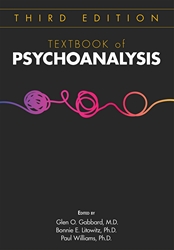Handbook of Mentalizing in Mental Health Practice, Second Edition
View Pricing
Description
This new edition of Handbook of Mentalizing in Mental Health Practice reflects a vibrant field undergoing development along a number of dimensions important for mental health.
As evidenced by the number of experts contributing chapters that focus on specialized approaches to mentalization-based treatment (MBT), the range of mental disorders for which this therapy has proved helpful has substantially increased, and now includes psychosis. Second, the range of contexts within which the approach has been shown to be of value has grown. MBT has been found to be useful in outpatient and community settings, and, more broadly, with children, adolescents, couples, and families, and the social contexts where they are found, such as in schools and even prisons. Finally, the framework has been shown to be generalizable to an understanding of the social context of mental health. The model advanced in this book goes beyond an understanding of the development of mentalizing and aims to provide an understanding of its role in a range of social processes.
Key concepts, themes, and approaches clearly articulated throughout the book include the following:
- Mentalizing is a transdiagnostic concept applicable to a range of mental health conditions, including trauma, personality disorders, eating disorders, depression, substance use disorder, and psychosis. The chapters devoted to these disorders emphasize MBT skills acquisition and techniques for introducing mentalizing into psychotherapy.
- Mentalizing plays an important role in understanding how teams, systems, and services interact to facilitate or undermine interventions and service delivery. Chapters on mentalizing in teams and wider systems are included to help clinicians reduce negative impacts on clinical care and support reliable and responsive pathways to treatment.
- In an effort to encourage clinicians to integrate mentalizing into their clinical practice, empirical research on the developmental origins of mentalizing and how a focus on mentalizing can improve outcomes for patients is incorporated throughout the volume.
- Improved mentalizing increases resilience to adversity, perhaps protecting individuals from relapse, and improves therapeutic outcomes. The relevant research, as well as proven techniques for promoting resilience and trust, are discussed at length in the book.
- Finally, as an established component of the literature on neurobiology and higher-order cognition, mentalizing benefits from a number of different strands of research, ranging from neurobiology through child development to adult psychopathology. The book fully explores these relationships and their ramifications.
Authoritative, comprehensive, and cutting-edge, the Handbook of Mentalizing in Mental Health Practice is the single most important resource for clinicians and trainees learning about—and incorporating—MBT into their therapeutic repertoire.
Contents
- Preface
- Part I: Principles
- Chapter 1. Introduction
- Chapter 2. Contemporary Neuroscientific Research
- Chapter 3. Assessment of Mentalizing
- Chapter 4. Mentalizing, Resilience, and Epistemic Trust
- Chapter 5. Mentalizing and Trauma
- Part II: Clinical Practice
- Chapter 6. Individual Therapy Techniques
- Chapter 7. Group Therapy for Adults and Adolescents
- Chapter 8. Working With Families
- Chapter 9. Couples Therapy
- Chapter 10. Therapeutic Models
- Chapter 11. Creative Arts Therapies
- Chapter 12. Partial Hospitalization Settings
- Chapter 13. AMBIT: Engaging the Client and Communities of Minds
- Chapter 14. Social Systems: Beyond the Microcosm of the Individual and Family
- Part III: Specific Applications
- Chapter 15. Children
- Chapter 16. Parenting and Foster Care
- Chapter 17. Borderline Personality Pathology in Adolescence
- Chapter 18. Conduct Disorder
- Chapter 19. Borderline Personality Disorder
- Chapter 20. Antisocial Personality Disorder in Community and Prison Settings
- Chapter 21. Avoidant and Narcissistic Personality Disorders
- Chapter 22. Eating Disorders
- Chapter 23. Depression
- Chapter 24. Comorbid Substance Use Disorder and Personality Disorder
- Chapter 25. Psychosis
Contributors
- Elizabeth Allison, D.Phil.
Nina Arefjord, Cand Psychol.
Eia Asen, M.D.
Dawn Bales, Ph.D.
Dickon Bevington, M.A., M.B.B.S.
Efrain Bleiberg
Chloe Campbell, Ph.D.
Karin Ensink, Ph.D., M.A. [Clin Psych]
Sebastian Euler
Clare Farrar
Peter Fuggle, Ph.D.
Thorsten-Christian Gablonski, Dipl.-Psych.
Sune Bo Hansen
Dominik Havsteen-Franklin, Ph.D.
Mickey Kongerslev
Alessandra Lemma, M.A., M.Phil., D.Clin.Psych.
Karin Lindqvist, M.Sc.
Kari Lossius
Patrick Luyten, Ph.D.
Tobias Nolte, M.D., M.Sc.
Norka Malberg, Psy.D., L.P.C., Ed.M., M.S.
Saskia Malcorps, M.Sc.
Nick Midgley, Ph.D.
Nicole Muller, M.Sc.
Katharina Morken
Anna Motz, B.A., C.Foren.Psychol., Dip.Clin.Psych.
Sheila Redfern, Ph.D.
Paul Robinson, M.D.
Trudie Rossouw, M.B.Ch.B.
Ellen Safier
Sebastian Simonsen, Ph.D.
Finn Skarderud, M.D., Ph.D.
Carla Sharp, Ph.D.
Mary Target, Ph.D.
Brandon Unruh, M.D.
Svenja Taubner, Prof. Dr. Phil.
Jessica Yakeley, M.B. B.Chir., M.R.C.P., F.R.C.Psych.
About the Authors
Anthony Bateman, M.A., FRCPsych, is Visiting Professor at University College London, Affiliate Professor in Psychotherapy at Copenhagen University, and Consultant to Anna Freud National Centre for Children and Families in London.
Peter Fonagy, Ph.D., FBA, FMedSci, FAcSS, is Professor of Contemporary Psychoanalysis and Developmental Science at University College London, and Chief Executive of the Anna Freud National Centre for Children and Families in London.
Related Products
Carousel Control - items will scroll by tabbing through them, otherwise arrows can be used to scroll one item at a time








